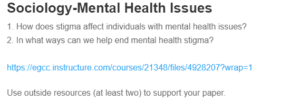Sociology-Mental Health Issues
The stigma associated with mental health problems is in some way worse than the disease itself, causing some scholars to term it a secondary illness (Maunder & White, 2019). Stigma can diminish an individual’s self-esteem and rob them of social opportunities. Individuals with mental illness often report encountering negative attitudes and undergoing discrimination in various domains such as family and friends, employment, education, housing, intimate relationships, and dealing with health and law enforcement professionals (Maunder & White, 2019; Parle, 2012). Being stigmatized for having mental health problems could cause individuals to lack confidence, hence increasing their tendency to isolate themselves from society and reinforcing their feelings of social withdrawal and exclusion. Our assignment writing help is at affordable prices to students of all academic levels and academic disciplines.
Most individuals with mental health problems are depicted as violent, incompetent, and impulsive, and this causes them to be objects of derision and ridicule. According to Huggett et al. (2018), such individuals also claim to have feelings of anger, hopelessness, anxiety, shame, and fear due to stigma and negative experiences. Most resort to non-disclosure and social isolation, which worsens mental health problems.
Even though various interventions to lessen stigma exist, there is a significant methodological difference, making it difficult for decision-makers to pinpoint the most effective strategies. Establishing contact with individuals suffering from mental health problems has been considered among the most effective ways of ending or reducing stigma (Maunder & White, 2019). Other commonly used strategies are protest strategies, where individuals are shamed for holding stigmatizing views, and educational strategies, where presenters tend to contrast the myths about mental health illness with factual information so as to lessen overreliance on stereotypes. Greenstein (2017) advocates for talking openly about mental health, being conscious of language, and showing compassion for individuals with mental illness in order to lessen stigma.
References
Greenstein, L. (2017). 9 Ways to Fight Mental Health Stigma. National Alliance on Mental Illness. https://www.nami.org/blogs/nami-blog/october-2017/9-ways-to-fight-mental-health-stigma
Huggett, C., Birtel, M. D., Awenat, Y. F., Fleming, P., Wilkes, S., Williams, S., & Haddock, G. (2018). A qualitative study: experiences of stigma by people with mental health problems. Psychology and Psychotherapy: Theory, Research and Practice, 91(3), 380-397.
Parle S (2012) How does discrimination affect people with mental illness? Nursing Times [online]; 108: 28, 12-14
Maunder, R. D., & White, F. A. (2019). Intergroup contact and mental health stigma: A comparative effectiveness meta-analysis. Clinical psychology review, 72, 101749.
ORDER A PLAGIARISM-FREE PAPER HERE
We’ll write everything from scratch
Question
Sociology-Mental Health Issues
- How does stigma affect individuals with mental health issues?
- In what ways can we help end mental health stigma?
Sociology-Mental Health Issues
https://egcc.instructure.com/
Use outside resources (at least two) to support your paper.


